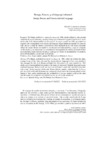Baroja, Besses y el lenguaje informal: estudio lexicográfico

View/
Use this link to cite
http://hdl.handle.net/2183/30381
Except where otherwise noted, this item's license is described as Atribución-NoComercial-CompartirIgual 4.0 Internacional (CC BY-NC-SA 4.0)
Collections
Metadata
Show full item recordTitle
Baroja, Besses y el lenguaje informal: estudio lexicográficoAlternative Title(s)
Baroja, Besses, and Unconventional Language: Lexicographical StudyAuthor(s)
Date
2022-02-02Citation
Carbonell Basset, D. (2022). Baroja, Besses y el lenguaje informal : Estudio lexicográfico. Revista de Lexicografía, 27(1), 35-46. https://doi.org/10.17979/rlex.2021.27.1.8644
Abstract
[Resumen] Pío Baroja publicó su novela La busca en 1904, donde refleja la vida popular madrileña de aquel momento y emplea el lenguaje informal de la gente humilde en su lucha por la vida. Luis Besses publicó su Diccionario de argot español en 1905, que marcó un pequeño hito lexicográfico en el estudio del lenguaje jergal español. El vasco no pudo utilizar la obra de Besses y recopiló las voces argóticas de la vida misma, haciendo trabajo de campo. Besses no empleó la novela para recopilar palabras, y aquí se comparan los dos títulos, y se demuestran las coincidencias lexicográficas de ambos, poniendo énfasis en la seriedad y buen hacer de los dos, a la par que se verifica la actualidad de 40 vocablos, de los 60 estudiados, y su devenir en el tiempo. [Abstract] Pío Baroja published his novel La busca in 1904, where he mirrors the daily, average living of the time, and uses the unconventional language of low-class people in their struggle for life. Luis Besses published his Diccionario de argot español in 1905, which was a lexicographical milestone in the study of peninsular Spanish slang and unconventional language. Baroja could not make use of Besses’s work and compiled slang from reality itself, doing linguistic field-work. Besses did not compile words from the La busca, and here both novel and dictionary are compared, which show the lexicographical coincidences in both works, emphasizing the scholarship of the two authors while at the same time 40 words are compared, and studied in time, out of the 60 considered.
Keywords
Pío Baroja
Luis Besses
La busca
Argot español
Jergas
Spanish slang
Cant
Luis Besses
La busca
Argot español
Jergas
Spanish slang
Cant
Editor version
Rights
Atribución-NoComercial-CompartirIgual 4.0 Internacional (CC BY-NC-SA 4.0)
ISSN
2603-6673
1134-4539
1134-4539






